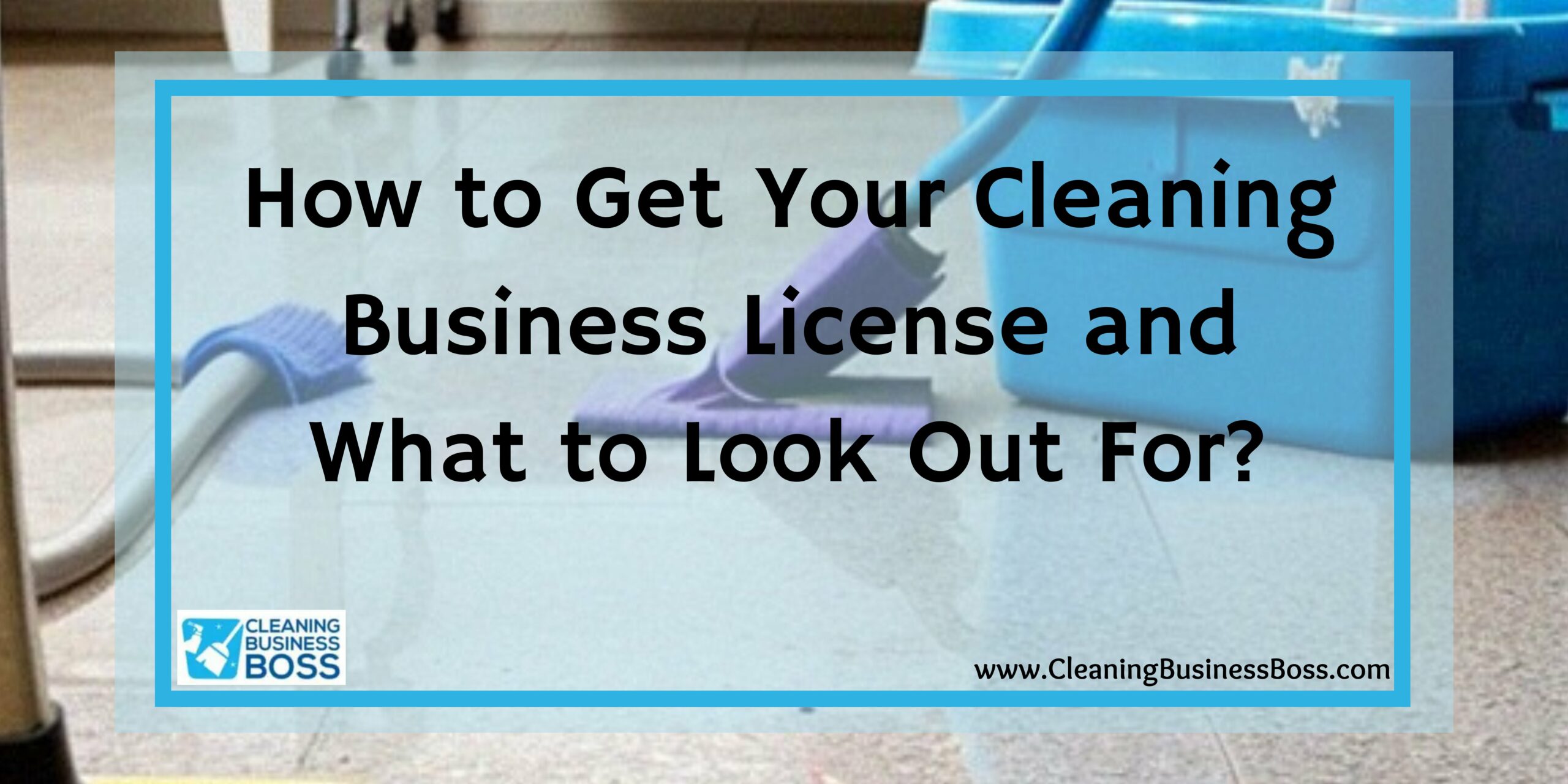When you first decide to open a cleaning business, there are countless questions running through your mind. Starting a new business is an exciting adventure, but it can also seem daunting at first. There is a lot of pressure to do everything correctly! One of the most common questions we receive is, “Do I need a business license for my new cleaning business and how do I get one?” To make this process simple, we are going to cover the 7 key steps you need to complete in order to get a license for your cleaning business.
In order to get your cleaning business license, you will need to:
- Visit the Small Business Administration’s Licenses and Permits Page on Your Local Government’s Website
- Understand the Different Types of Business Structures
- File the Appropriate Application for Your License
- Find Business Insurance to Protect Your Company
- Get Bonded Even if it’s Not Required in Your Area
- Consider Business Tax for Your Type of License
- Renew Your Business License Annually
Step 1: Visit the Small Business Administration’s Licenses and Permits Page on Your Local Government’s Website
Depending on your specific location, the type of licenses required for a cleaning business will vary. In order to ensure that you apply for the correct license in your area, you need to visit the Small Business Administration’s Licenses and Permits page on your local government’s website. This page will outline the exact business license you need for the type of company and service you are operating.
When you are on this page, you will want to pay attention to the type of license required, the type of business insurance required and if you are required to be bonded. This will be important information for you to have as you move forward with getting your business license. If you are required to be bonded and get business insurance, it is very likely that you will need to show proof that you’ve met the requirements before getting a business license. You can save yourself time by getting bonded and purchasing business insurance before submitting your application or visiting your local city’s courthouse.
If you move or relocate in the future to a different state, you will need to complete this task again. Your new state may have different requirements for your cleaning business, like potentially requiring you to be bonded or obtaining a different amount of business insurance. Even if you don’t move, we recommend checking back on this page throughout the years to make sure that you are on top of all the legal documents for your business.
If your business operates in more than one state, you will want to ensure that you are fully legal in all states that you are providing service in. It is likely that your additional states could require additional documents. We will also cover the type of business structure you may want to consider in the next step for those who plan on operating in more than one location.
The main key for the Small Business Administration’s Licenses and Permits page is to have a full understanding of what is required for your new business. If you are confused by any of the information, we recommend calling and asking a member of your local government. It will be vital to your business to ensure that you know exactly what documents are required for you to operate legally.
Step 2: Understand the Different Types of Business Structures

After researching the Small Business Administration’s Licenses and Permits page, you will know what license is required for you to attain in order to operate as a legal company. However, if your state has low requirements for licenses, you may want to consider a license and business structure that offers more protection. Gaining knowledge of the different types of business structures will only be beneficial as you move forward in your new business venture.
The first type of business structure is a sole proprietorship. This type of business is owned and operated by a single owner. A sole proprietorship is also the simplest business structure and often involves the least amount of paperwork. If you plan on working alone and do not desire to grow your cleaning business to a large organization, this could be the best structure for your business.
The most important thing to keep in mind for a sole proprietorship is that there is no separation between you and your business. For example: If someone files a lawsuit against your business and you operate as a sole proprietor, the person who is suing you could come after your personal assets since those are not separate from your business. If you are looking for more liability protection, you will want to consider another business structure besides operating as a sole proprietorship (even if you are the only owner).
Are you starting a cleaning business with your sister, best friend, or husband? You may want to consider the second type of business structure, which is a partnership. There are two types of partnerships: limited partnerships and general partnerships. In a general partnership, the partners take responsibility for the company’s debts and all obligations. A limited partnership has both general partners and limited partners. Only the general partners have responsibility for the company’s debts and obligations. The limited partners do not take responsibility for any obligations but act only as investors. Limited partnerships are generally for more established businesses and are not common for new, small businesses. If you plan on having investors in your business, this may be the structure best for you.
Like a sole proprietorship, partnerships are also personally responsible for all the company’s obligations. There is not a large amount of protection with this structure. However, a partnership involves more legal work than a sole proprietorship and will also be more expensive to operate in the long run (due to more accounting work).
The third type of business structure to consider is a Limited Liability Company (known as an LLC). This structure can be owned by one or multiple owners. The significant difference of this structure is it offers the owners protection for their personal assets. LLCs are also relatively simple to form and offer tax benefits. The profits are only taxed once. If you plan on growing your cleaning business to become a larger organization, we highly recommend you consider creating this type of business structure for your new company. It also adds a lot of credibility to your business when you can say it is an LLC. It adds another layer of trust for your customers.
The last type of business structure is a Corporation. However, this type of structure is the most complex and is commonly only used for extremely large organizations. One of the first 3 types of structures will be the best option for your cleaning business as you get started.
To decide on the type of business structure for your company, you will want to consider how many owners will be operating the business and the type of liability protection you personally want for your business. You also want to keep in mind what your goals are for your business and how you are looking to grow in the future, as it will be easier to choose the best business structure in the beginning.
Step 3: File the Appropriate Application for your License
Now that you’ve decided on the type of business structure you want and you know the licenses you are required to have for your state, it is time to file the required application to attain your licenses. The applications can be found on your local government’s website or by visiting your city’s courthouse.
Before filling out the application, you need to thoroughly research and decide on your business name or the name you will be doing business as. In order to get your license approved, your business name must not be already in use by another company in your area. If you put a name that is already in use on your application, it will be denied. You can search other business names in your area by doing an extensive Google search. Some local governments will even provide a search option to see if your business name is already taken in your area.
You also want to make sure that you have gathered all the information needed before submitting your application. By ensuring that it is filled out properly and includes all the documents required, you will have a much higher chance of your application being approved. When you must revise and fix your application after it is denied, you are losing out on valuable time that you could be spending growing your business.
Step 4: Find Business Insurance to Protect Your Company

All cleaning businesses need insurance! When you are cleaning homes for your clients, they are trusting you with their valuable and sentimental belongings. By operating without insurance, you are taking a dangerous risk for you, your business and your clients. Of course, we never want to expect accidents will happen, but we do want to be prepared in case a situation arises. If you do not have business insurance and something happens to your client’s home or items, you can be held personally responsible for any damages caused. Insurance acts as a protection for you and your business. It is always better to stay on the safe side!
One factor to keep in mind when researching different options for business insurance is knowing what your state requires. As we mentioned above, some states will require you to have proof of insurance before approving your business license. When you are deciding on the amount of coverage to get for your business, you will want to first refer to the amount that is required for your area. Next, you will want to think about how large your business currently is. If you have multiple employees and a full cleaning calendar, you will want to invest in more coverage. You can always easily increase the coverage as your business grows as well by reaching out to your insurance agent.
If your state doesn’t require insurance in order to get the business license, your cleaning business at least needs general liability insurance. Once your company grows and you use a specific cleaning vehicle, you will need to add auto insurance. When you make the decision to hire on employees for additional help, you will also need workers’ compensation in case your workers are injured at a cleaning job. Although the amount of coverage may vary per state, all states will require you to have workers compensation insurance once you have a W2 employee.
To potentially save a large amount of money, we recommend taking the time upfront to receive quotes on business insurance. Take an hour out of your day to reach out to at least 5 insurance companies to see what the cost will be for business insurance. You will want to pay attention to the amount of coverage offered for the price, what the deductible for an accident would be and if the company offers any other type of services that may be beneficial for you. After comparing prices and the benefits offered, you will be better prepared to decide on what insurance company is the best pick for your business.
Step 5: Get Bonded Even if it’s Not Required in Your Area
Depending on the area that your business operates in, you may be required to get bonded before you can apply for a business license. Even if your state does not require you to be bonded, it is still highly recommended to take the time to get bonded. Bonds for cleaning businesses are called janitorial service bonds.
The purpose of the bond is to act as protection to your customer if one of the cleaning professionals is found guilty of stealing from the home. A janitorial service bond acts as a contract between these three different parties: your company, your customer and the insurance company that is providing the bond. If your employee is found guilty in a court of law, the insurance company would then cover the cost to replace the items for your client.
If you are the only one cleaning for your business at this time, you may think there is no point in investing in getting bonded. Before you make the decision to not get bonded, there are two factors you will want to consider.
First, you want to consider the advantage of being bonded in the eye of the customers. When you are advertising or talking to a new potential customer, being bonded sets you apart from your competitors who are not bonded. It adds that extra layer of trust for your customer and makes you appear more reputable.
Next, you want to consider what your ultimate goals and vision are for your business. Do you see yourself growing and adding on additional help in the future? You may be the only one completing the cleaning now, but you will need to hire employees if you want to grow and expand in the future. Getting bonded is highly recommended, especially when you have other people working for you.
Choosing the amount of coverage that your bond offers is at your own discretion! Typically, surety bonds are available in any amount ranging from $10,000 to $100,000. Like we mentioned above for business insurance, when deciding on the amount of coverage, you will want to consider the size of your current company. If you only have one employee so far, a bond with coverage up to $10,000 would be well suited for you. As your business grows, you can always reach out to the insurance company you use and increase the amount of coverage for your bond. You don’t have to start out with a large amount of coverage in the beginning.
We asked the owner of Same Day Cleaning based out of Salt Lake City, Utah why she thinks being bonded and investing in insurance is important. Her response was, “When I am talking a potential client, the first thing they ask me is if I’m licensed, bonded and insured. The peace of mind that being bonded gives you in your business is well worth the investment. You will never regret having extra security and protection in your business!”
Step 6: Consider Business Tax for Your Type of License
The step that most new business owners typically dread the most is paying taxes! When you first begin working for yourself and open your own business, it is easy to forget about taxes. You were used to someone else taking taxes out of your paycheck before you even saw the money! Now that you own a business, taxes are one of the most vital steps to operating properly. Taxes can not be ignored!
The number one piece of advice we want to give you regarding taxes is to save regularly! Now that taxes aren’t being taken out of a paycheck for you, it is vital that you consistently put money away to pay your own taxes. If you don’t put money away regularly, you will be wishing you did when you get your tax bill later down the road. As a safe estimate, we recommend that you put away 30% of what you make aside for taxes. We know it hurts putting away that much, but you will be glad you did later.
The second tip when it comes to taxes is investing in an accountant. Once you open your own business, taxes become a lot more complex than they were previously as an employee. An accountant will help you ensure that you are filing the right types of taxes depending on your business structure. We recommend getting in touch with an accountant shortly after opening your business since you may need to pay taxes quarterly, depending on your license.
If you have owed the government money in the past, you know that paying taxes properly is not an area that you want to skip out on. If you are late or avoid paying the federal and state government taxes, you could end up paying expensive fees in the end. Making sure your business is paying all the correct taxes is vital to the success of your business.
Know the license you need in operating your cleaning business by checking out this article here.
Step 7: Renew Your Business License Annually

By the time you have reached this step, you have successfully run your business for a year! It is easy to think that you don’t have to worry about any more paperwork once you first get your business up and running. However, some of the documents you filled out in the beginning do require you to renew annually. The most important document that you will be renewing every year is your business license.
Every year, you typically will receive a notice in the mail by your local government, letting you know it is time for you to renew your business license. You can expect to receive this notice about 1-2 months before the annual anniversary month of when you opened your business. When you receive your notice, the first thing you want to look for is the date that your renewal is due. By missing the due date, it is likely you will have to pay additional fees. In some states, the charge of renewing your license can even double in price if you are late. Depending on how late you are in renewing your license, you can put your business license in jeopardy. This is not something you want to risk, so make sure you pay attention to your due date.
The second thing you want to find on your notice is how much you will need to pay to have your license renewed. In most states, the annual renewal fee will stay the same most years, unless it is time for it to be raised. This fee is also typically much less than the original fees you paid to receive your business license as a new business. However, renewing your license annually is just as important as filing your license in the first place.
Starting your new cleaning business and getting your cleaning business license does not have to be a time consuming or stressful task! When it comes to the 7 steps mentioned above, the most important factor to keep in mind is doing your research and ask for help if you need it! No matter what state you reside in, there are resources available to you to help you along the path of getting your business license. By making sure that you invest in all the required legal documents and tools, your new cleaning business will be set up for success!
Frequently Asked Questions
How do I get a business license if my business operates in more than one state?
If your business provides service in more than one state, we recommend investing in a business structure like a Limited Liability Company (LLC). However, you will still need to do the research in each state to make sure you are following all the requirements. The requirements for opening and operating an LLC will vary depending on the state.
An LLC business structure will provide you with more protection as you grow your business in multiple locations. It will also provide tax benefits, which could end up saving you money in the long run.
Another factor to keep in mind when operating in more than one state is the requirements when it comes to being bonded and getting business insurance. You will want to thoroughly research the requirements in each state you operate in to make sure that you have enough business insurance coverage.
If I am the only person completing the cleaning jobs, do I still need insurance?
No matter what type of structure your business has, we always recommend investing in business insurance! Even if you are the only one completing each cleaning job, there is always the chance an accident can happen, no matter how safe you are being. By not getting business insurance, you are taking the risk of being personally responsible for any damage that may happen in your client’s home while you are cleaning.
In our opinion, getting business insurance should be one of the very first steps you take when you start cleaning homes. You will never regret being extra protected!
How can I make sure that I got the right cleaning business license for my area?
If you have read the information available to you on the Small Business Administration’s Licenses and Permits page and you still are unsure if you are applying for the correct business license, we recommend contacting your local government. By visiting the website for your local government, you can often find a phone number to call. You can also visit the city building to ask a staff member for clarification on the requirements for your business.
It is always better to be safe and ask for additional help than accidentally get the wrong license required for your area.
To learn more on how to start your own cleaning business, check out my startup documents here.
Please note that the contents of this blog are for informational and entertainment purposes only and should not be construed as legal advice. Any action taken based on the information provided in this blog is solely at your own risk. Additionally, all images used in this blog are generated under the CC0 license of Creative Commons, which means they are free to use for any purpose without attribution.

About the author. Entrepreneur and Cleaning Business Fan.
Hi! I am Shawn and I am a happy individual who happens to be an entrepreneur. I have owned several types of businesses in my life from a coffee shop to an import and export business to an online review business plus a few more and now I create online cleaning business resources for those interested in starting new ventures. It’s demanding work but I love it. I do it for those passionate about their business and their goals. That’s why when I meet a cleaning business owner, I see myself. I know how hard the struggle is to retain clients, find good employees and keep the business growing all while trying to stay competitive.
That’s why I created Cleaning Business Boss: I want to help cleaning business owners like you build a thriving business that brings you endless joy and supports your ideal lifestyle.


2 thoughts on “How to Get Your Cleaning Business License and What to Look Out For?”
Comments are closed.